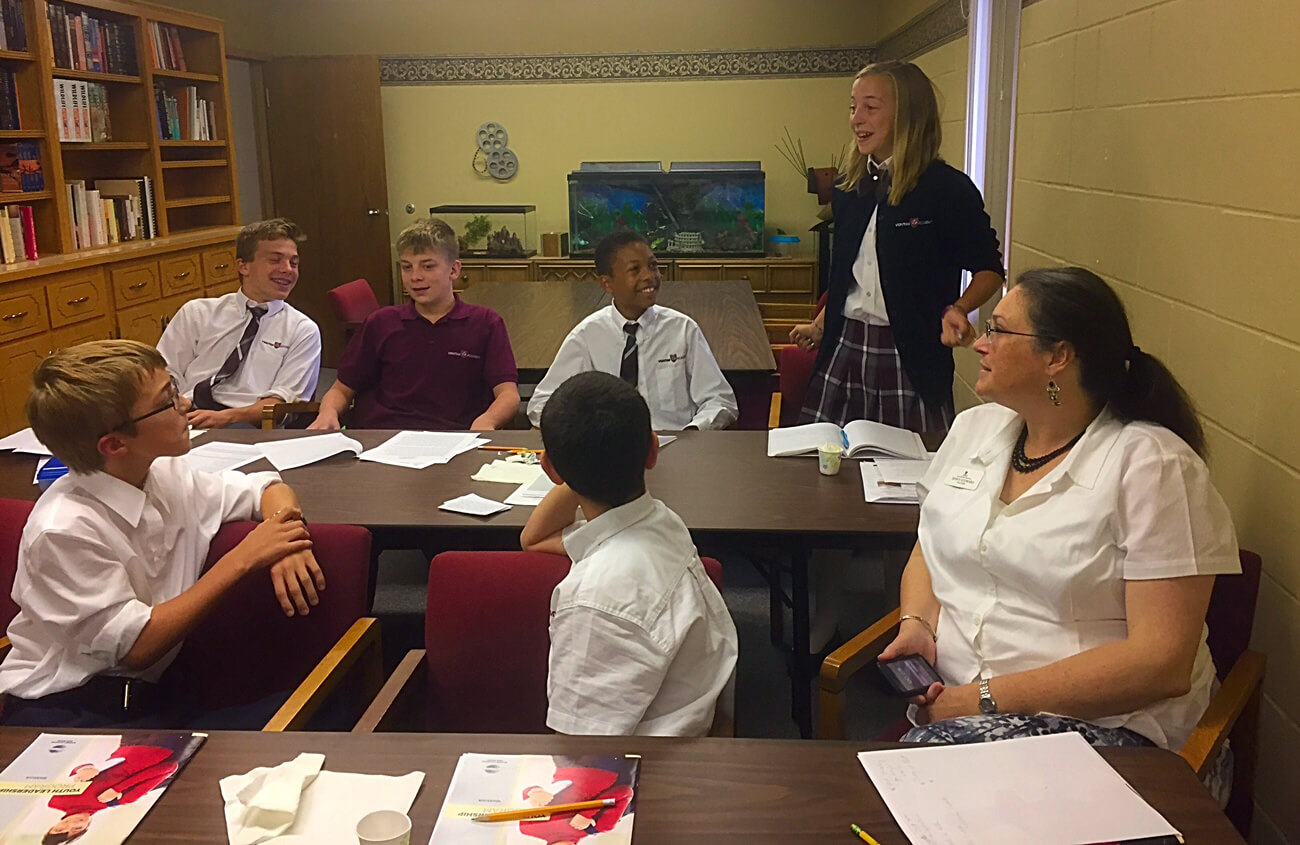Tell Me a Story: Using Tolkien to Teach Character
by Patience Griswold, US Government and Public Speaking
Around the world from time immemorial, children have been making the request, “tell me a story!” This is hardly surprising. After all, humans are creatures of story—we tell stories to make sense of life, to communicate about ourselves and learn about others, to illustrate values and lessons, and most of all, as a medium for truth. The power of story is the reason I love literature and love sharing literature with the students at Veritas. Story is a powerful medium for communicating important truths about leadership, character, and integrity.
This year the Logic and Rhetoric students are reading a favorite series of mine, The Lord of the Rings. Reading these books with my students has been such a delight and a constant reminder to me of the power of story to teach about character. Stories pair truth with images and emotions, helping students to better understand and take to heart the lessons they are being taught. It’s one thing to tell a student to memorize, “flee temptation.” It’s another thing when he has a story that calls to mind the reality that temptations are often very strong, but there are grave consequences when we choose to be overpowered by them.
Through Tolkien, students learn what courage in the face of fear looks like. It looks like Bilbo’s decision to go on when he stops in the tunnel on the way to Smaug’s lair. In that moment, all of Bilbo’s doubts are creeping up on him, the desire to turn and run is strong, and the realization that he can’t change his mind once he enters the dragon’s sleeping place is overwhelming him. Nevertheless, he decides to put one foot in front of the other and face the adventure that drew him to run out of his comfortable hobbit hole in the first place.
Through the characters in The Lord of the Rings, students also learn what Christ-like leadership looks like. It looks like Aragorn’s patience with a group of frightened hobbits. It looks like Gandalf’s sacrifice on the bridge of Khazad-dum. It looks like Faramir allowing himself to take Denathor’s wrath in order to protect the ring-bearer.
Each of these lessons could be communicated as a succinct propositional statement. Courage is moving forward in the face of fear. Leaders show patience with weak followers. Leaders will sacrifice for those they lead. Leaders will bear their followers’ burdens. These statements are all true, and there is nothing wrong with communicating truth in the form of statement. In fact, it’s very important, for the sake of clarity, that we do present truth in the form of clear, succinct, analyzable statements. However, we should be ready and able to communicate truth in other ways, as well. Good stories bring truth to life in a tangible way.
Imagination is incredibly powerful, and, unchecked and untrained, can wreak havoc. It can create a false narrative around a real event, distorting reality in a way that damages friendships, attacks reputations, and calls good evil and evil good. But imagination does not have to be the enemy. In fact, it can and should be trained for good. Fear is powerful because it captures the imagination; story is powerful in the face of fear because it trains the imagination. It is through story that the imagination is taught what courage looks like.
When a teen faces peer pressure, fear, or discouragement, the struggle going on in her heart and mind is usually far more emotional than intellectual. As such, it is a challenge that must be met with truth that is not only known, but felt. We rarely feel propositional statements. We feel stories.
The power of story to counter lies and foster a love of truth is not limited to the experience of children since the natural human love and desire for stories does not disappear upon arriving at adulthood. We may have less time to feed that desire, but the value of story does not diminish. Children who read become adults who read and adults who not only know truth intellectually, but deeply love and feel truth.
There are so many good reasons to read great books. They give us a grasp of where various ideas have come from and the consequences those ideas have had. Through the reading of great books, students are equipped with cultural literacy and engaged intellectually. Reading authors who have a command of language and are able to communicate with excellence helps students grow as writers. But more so than any of these things, great books have the ability to train a child’s affections, helping him to love the truth that is presented in literature, and helping him to grow in his love for the God of truth.
Recent Posts
What Everyone Is Saying About Veritas
We want the best life for our child. A best life starts with a strong foundation. Veritas Academy is that foundation. We couldn’t be happier with our choice to choose Veritas.
Because of Veritas Academy’s commitment to students, my children are motivated to learn, they are challenged at their skill level instead of being held back due to their ages.
Transition from other educational models is seamlessly supported. Staff and teachers are proactive and caring to the smallest detail. Leadership goes above and beyond for ALL students.
Veritas Academy prepared my child for college. His biology professor said his papers are some of the best first-time college papers she has ever seen.

